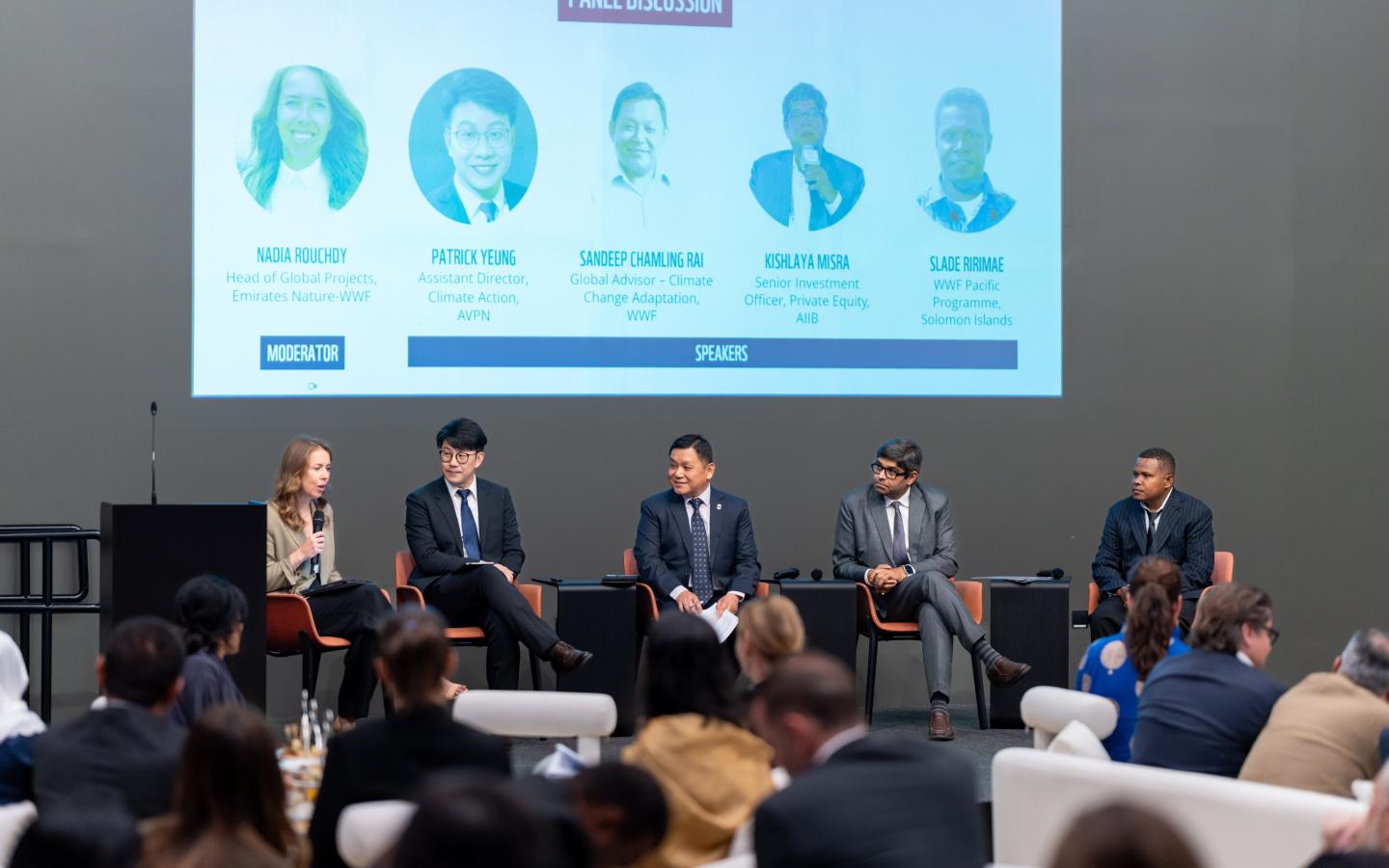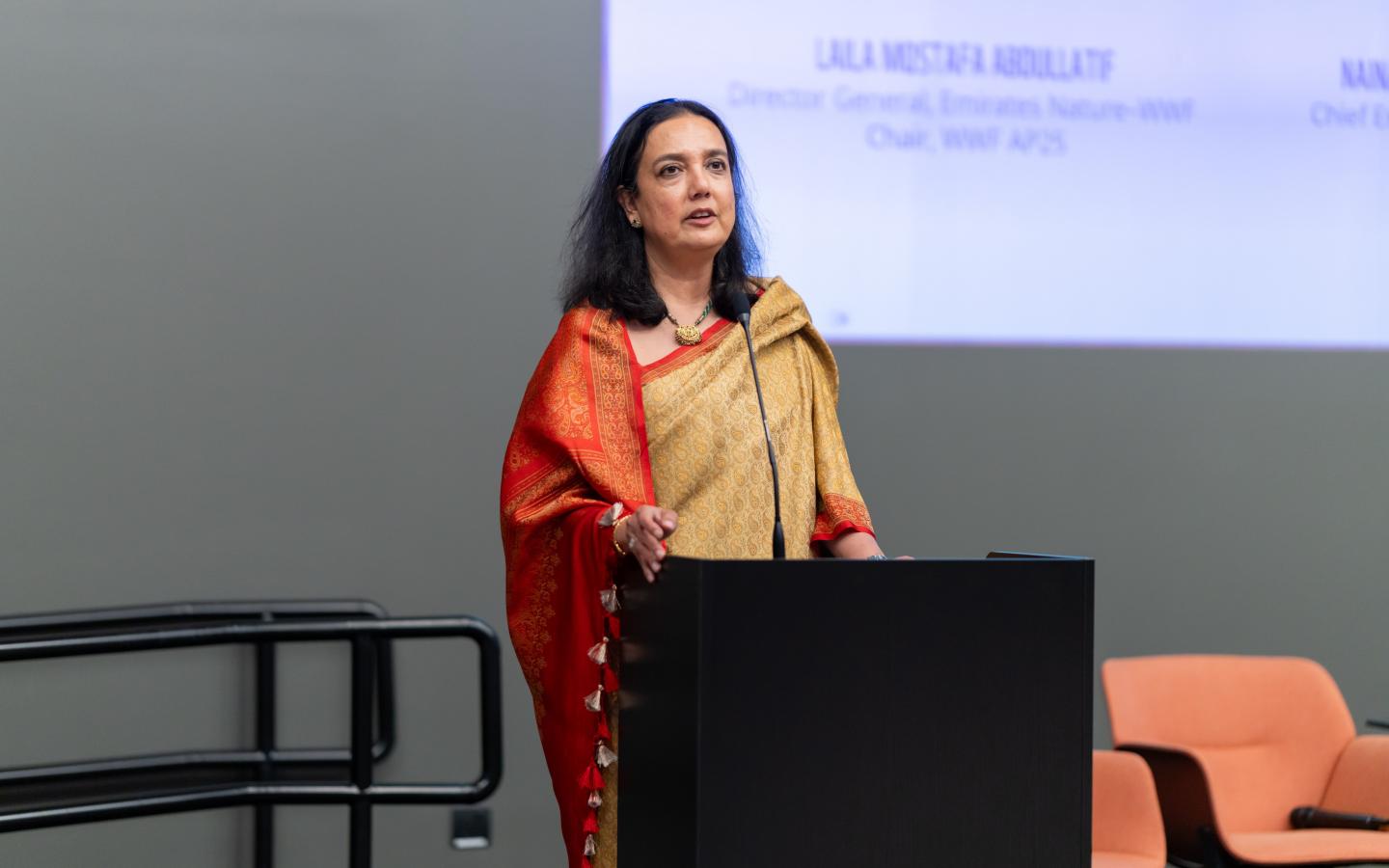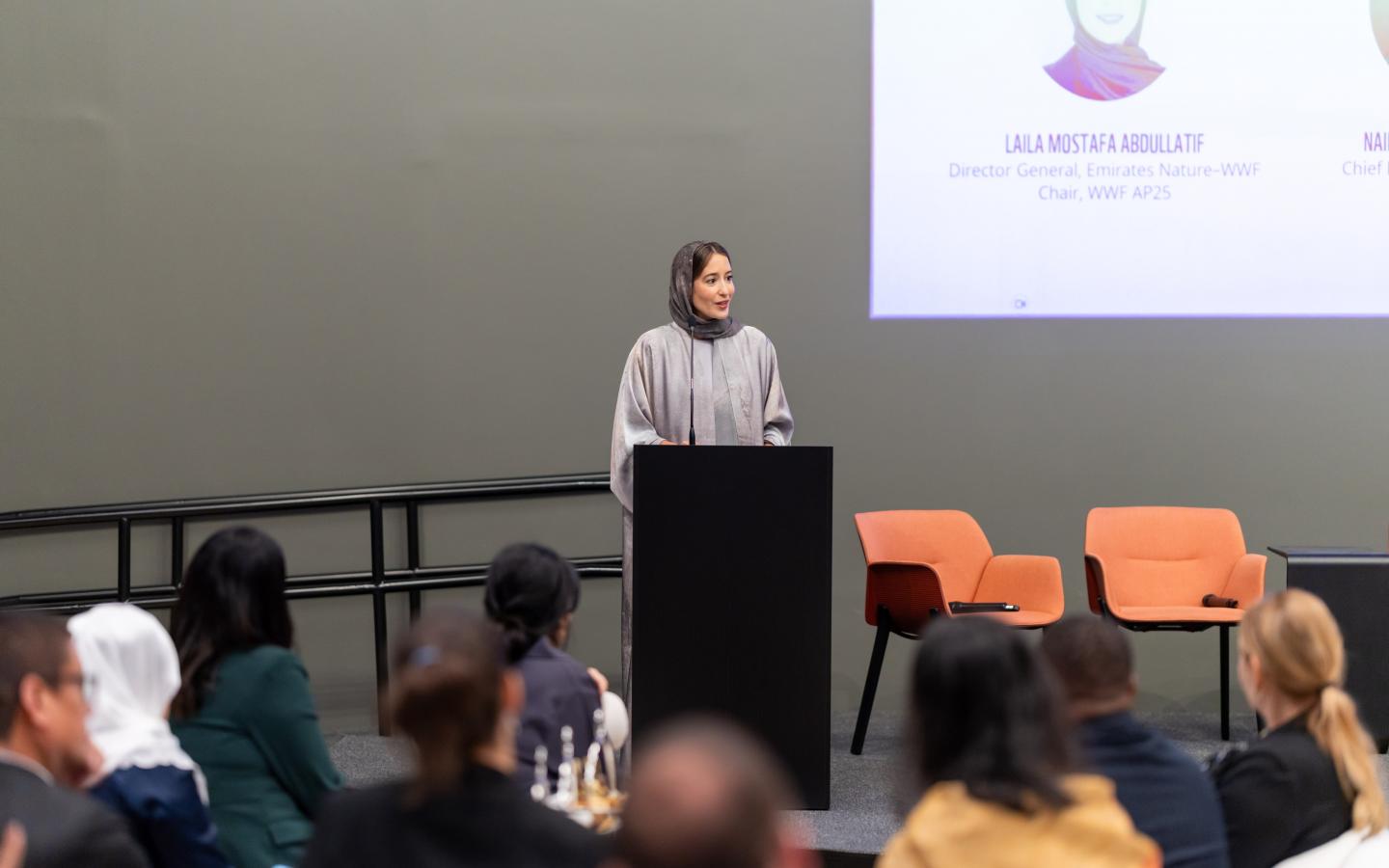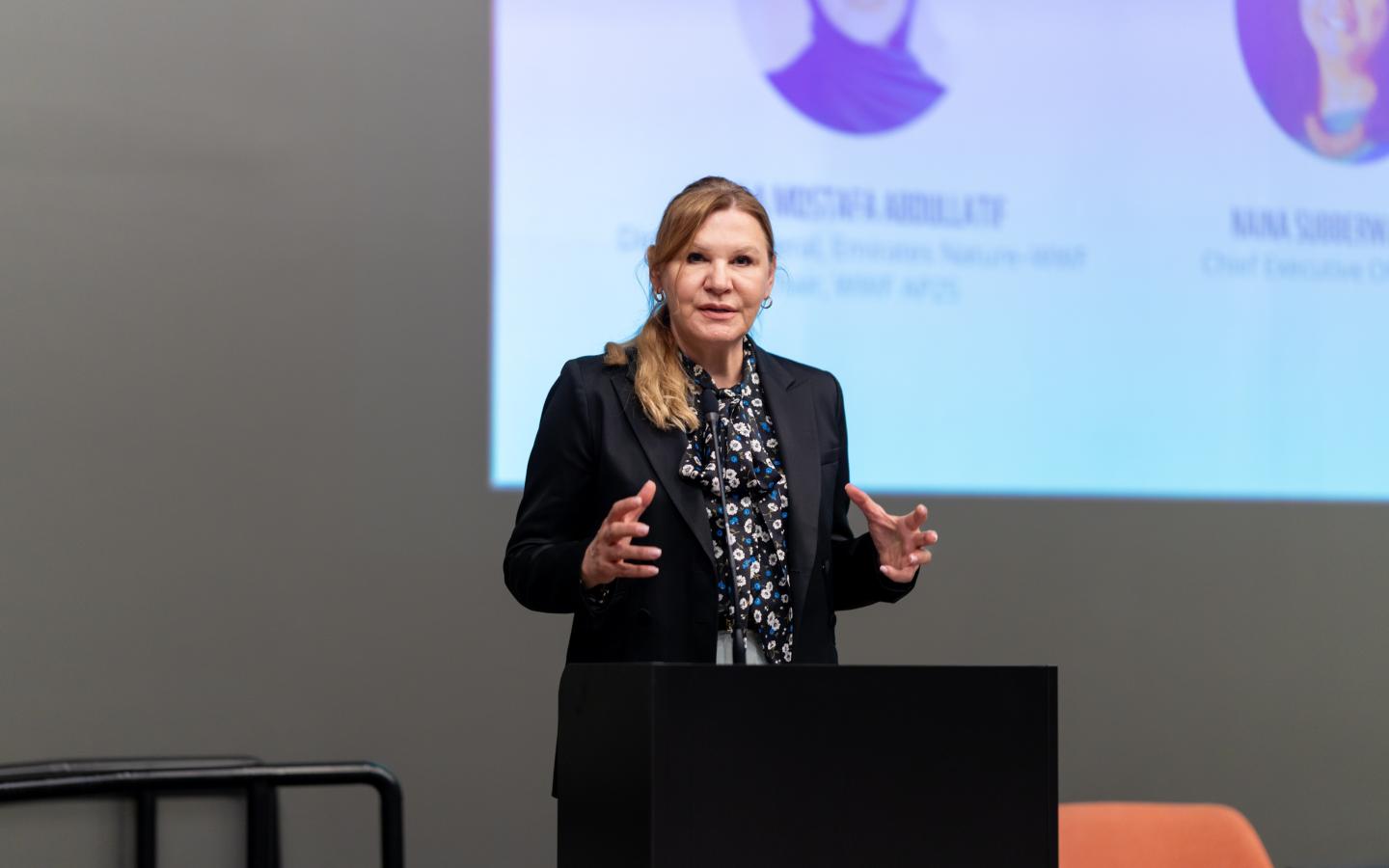Philanthropy for Climate Resilience: WWF and AVPN Catalyse Regional Action to Safeguard Communities and Ecosystems across Asia Pacific
- WWF and AVPN convened a high-level Philanthropic Roundtable that united donors, policymakers, and implementers to explore how philanthropy can accelerate systemic, community-led resilience across Asia Pacific.
- The Roundtable underscored the UAE’s emerging role as a regional hub for nature-positive action, bridging global ambition with localized impact to address escalating climate and disaster risks across the Asia Pacific.
- WWF and IFRC’s collaboration on Scaling Climate Resilient Communities was spotlighted—showcasing a unique model that integrates science, traditional knowledge, and local leadership to drive climate resilience and humanitarian outcomes.

Abu Dhabi, United Arab Emirates – 9 May 2025: Building on the momentum of the Worldwide Fund for Nature (WWF) Asia Pacific (AP25) Regional Conference and the Abu Dhabi convening of the Commission on Asian Philanthropy, WWF and AVPN convened a high-level Philanthropic Roundtable to explore the critical convergence between disaster resilience, climate adaptation, and Nature-based Solutions(NbS). The Roundtable focused on how strategic philanthropy can catalyse integrated, community-driven approaches that safeguard both people and ecosystems in the face of escalating climate impacts and disaster risks.
Welcoming remarks were delivered by Laila Mostafa Abdullatif, Director General of Emirates Nature–WWF and Chairperson at WWF Asia Pacific, Naina Subberwal, CEO of AVPN, and Nena Stoiljkovic, Under Secretary General of IFRC for Humanitarian Diplomacy and Digitalization, underscoring the growing need for convergence between philanthropy and frontline implementation on climate, nature and people. The session featured a dynamic panel discussion with perspectives from regional leaders.

Nature as the First Line of Defence
The Roundtable spotlighted how Nature-based Solutions—such as coastal restoration, regenerative agriculture, and watershed protection—can act as powerful shields, protecting both people and biodiversity from the intensifying impacts of climate change and hazards. Participants emphasized the urgent need to integrate NbS into disaster risk reduction, climate adaptation, and development strategies across Asia Pacific, where six of the world's ten most climate-vulnerable countries are located.
The dialogue reflected a critical shift in approach: from reactive disaster relief to proactive resilience-building. Instead of responding to crises after they strike, working hand-in-hand with local communities on the ground through nature-based, locally led solutions can dramatically reduce risks before disasters occur.
Naina Subberwal, CEO of AVPN, said: "As the challenges of climate change and disaster risks escalate, the role of philanthropy must evolve from funding projects to investing in systemic, scalable solutions. By fostering collaboration across sectors, and empowering local leadership, we can unlock the full potential of nature, communities, and innovation to build resilience across Asia Pacific. Strategic philanthropy is not just about supporting change—it is about accelerating it where it’s needed most."

Scaling Solutions, Strengthening Communities
The Roundtable also spotlighted the evolving collaboration between WWF and the International Federation of Red Cross and Red Crescent Societies (IFRC) to Scale Climate Resilient Communities across Asia Pacific. This unique model brings together scientific innovation, traditional knowledge, and community leadership to deliver climate resilience and humanitarian outcomes at scale. This includes partnering with local organizations to share expertise to reduce disaster risks, adapting to climate change together, through nature, real-life examples to bring this to life are:
- Coral reef and mangrove restoration, integrated in disaster management plans, to help shield coastlines from storms and coastal flooding.
- Reforestation and water management to enhance water security in droughts, supporting farmers and livelihoods.
- Climate-smart farming with drought-resistant crops and sustainable fisheries to promote food security, led by women, youth, and local communities.
These initiatives show that when ecosystems are strengthened, communities are better protected, livelihoods are sustained, and the pressure on humanitarian organizations are reduced.
By connecting global best practices with local knowledge and lived experiences, this initiative aims to create a powerful blueprint for catalytic investment and transformational impact across the region.
Laila Mostafa Abdullatif, Director General of Emirates Nature–WWF and Chairperson at WWF Asia Pacific said, "Our region is facing a future of growing complexity, where climate change, nature loss, and disaster risks are deeply interconnected. Resilience demands more than reactive solutions; it requires integrated action that empowers communities, protects ecosystems, and safeguards food, water, and human security. By bridging climate adaptation, disaster risk reduction, and Nature-based Solutions, we can chart a course towards a more resilient, regenerative future where both people and nature thrive." Reflecting its 25-year legacy as a trusted implementer in the UAE, Emirates Nature–WWF is now expanding its reach as a regional convener, mobilizing multi-sector partnerships that match the scale of today’s environmental challenges, scaling the work on climate resilient communities across the Asia Pacific region.
Nena Stoiljkovic, Under Secretary General for Humanitarian Diplomacy and Digitalization, IFRC, said, “To build true resilience, we must collaborate with organizations like WWF to deliver impact to people and communities at risk to climate-related disasters and facing the impacts of climate change. Our collaboration with WWF in the Asia Pacific region demonstrates how humanitarian actors and conservation partners can join forces to reduce risk, protect lives, and enable communities to thrive in a changing climate.” .

The Roundtable marks the first in a three-part dialogue series designed to catalyse philanthropic action on climate and disaster resilience. Insights and outcomes from the series will culminate in the launch of a strategic whitepaper at the AVPN Global Conference 2025 in Hong Kong in September, charting a new course for nature-based, community-driven resilience across Asia Pacific.
With the UAE increasingly recognized as a dynamic center for climate action and philanthropic engagement — and Emirates Nature–WWF serving as a pivotal facilitator — the shared journey toward a nature-positive and disaster-resilient Asia Pacific continues to gain momentum through collective effort and ambition.
